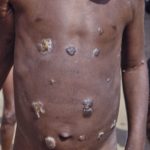 An infectious tropical infection of the skin, bones and joints caused by the spirochete bacterium Treponema pertenue, characterized by papules and pappiloma with subsequent deformation of the skins, bone and joints; also called framboesia.
An infectious tropical infection of the skin, bones and joints caused by the spirochete bacterium Treponema pertenue, characterized by papules and pappiloma with subsequent deformation of the skins, bone and joints; also called framboesia.
An infectious, nonvenereal tropical disease caused by Treponema pertenus. It is characterized by an initial lesion (the motheryaw), followed by further multiple lesions of the skin. It is also known as Framboesia.
A treponemal disease causing infirmity.
A tropical disease caused by the spirochaete Treponema pertenue. Symptoms include fever with raspberry-like swellings on the skin, followed in later stages by bone malformation.
Yaws is a chronic and contagious skin disease characterized by swollen, open sores; it primarily affects people living in rural, humid, and tropical climates. Yaws is characterized by three stages: primary, secondary, and tertiary.
Infection caused by the spirochete Treponema pertenue, transmitted by direct contact, chiefly among children, living in unsanitary conditions in tropical and subtropical areas. It is characterized by ulcerating sores on the body, leading to destruction of underlying tissue. Treatment is by penicillin.
A tropical infectious disease caused by the presence of the spirochete Treponema pertenue in the skin and its underlying tissues. Yaws occurs chiefly in conditions of poor hygiene. It is transmitted by direct contact with infected persons and their clothing and possibly also by flies of the genus Hippelates. The spirochetes enter through abrasions on the skin. Initial symptoms include fever, pains, and itching, followed by the appearance of small tumors, each covered by a yellow crust of dried serum, on the hands, face, legs, and feet. These tumors may deteriorate into deep ulcers. The final stage of yaws, which may appear after an interval of several years, involves destructive and deforming lesions of the skin, bones, and periosteum. Yaws, which commonly affects children, is prevalent in hot humid lowlands of equatorial Africa, tropical America, the Far East, and the West Indies. It responds well to treatment with penicillin and other antibiotics.
A non-venereal spirochaetal infection caused by Treponema pertenue; it was formerly widespread in most tropical and subtropical regions. It is directly contagious from person to person but infection is also transmitted by flies, clothing, and living in unclean huts. Clinically, the primary stage is characterized by a granulomatous lesion, or papule (framboesioma or ‘mother yaw) at the site of infection usually the lower leg or foot; this enlarges, crusts, and heals spontaneously. It appears some 2—8 weeks after infection, during which time fever, malaise, pains, and pruritus may be present. In the secondary stage, a granulomatous, papular, macular or squamous rash occurs; periostitis may also be present. The late, or tertiary stage (which appears 5—10 years later), is characterized by skin plaques, nodules, ulcers, hyperkeratosis (thickening of the skin of the hands and feet) and lesions affecting bones. Diagnosis is by demonstration of T pertenue in exudate from a suspected lesion. Treatment is with penicillin.
An infectious nonvenereal disease caused by a spirochete, Treponema pertenue, and mainly found in humid, equatorial regions. The disease is marked by fevers, joint pains, and caseating eruptions on the hands, feet, face, and external genitals. The infection is rarely, if ever, fatal but can be disfiguring and disabling. It is treated with penicillin.
Yaws is an infectious disease primarily prevalent in economically disadvantaged subtropical and tropical regions worldwide. It is caused by a spiral-shaped bacterium known as TREPONEMA PERTENUE, which shares similarities with the bacterium responsible for syphilis. It’s important to note that Yaws is not transmitted through sexual contact; its main mode of spread is in environments with inadequate hygiene. Typically, individuals contract this infection during childhood, and it primarily affects the skin and bones.
Bacteria gain entry into the body through skin abrasions. Approximately three to four weeks following infection, a bumpy, itchy growth resembling a raspberry emerges at the infection site, occasionally accompanied by fever and discomfort. This abnormal tissue area, known as a lesion, is highly contagious; scratching the affected area not only spreads the infection but also leads to the development of additional growths in other areas.
In the absence of treatment, the growths gradually heal over approximately six months, yet recurrence is frequent. In untreated instances, extensive tissue damage can eventually ensue, potentially resulting in severe destruction of the skin, bones, and joints in areas like the legs, nose, palate, and upper jaw.
Yaws can be effectively treated with a single, substantial dose of a penicillin medication administered via a muscle injection.
A contagious disease caused by the spirochete bacterium Treponema pertenue, typically found in hot climates. Yaws is characterized by the development of raspberry-like swellings on the face, hands, feet, and external genitalia. These swellings can merge to form larger masses, or they may evolve into pustules or ulcers. Yaws bears a close resemblance to syphilis as they are both caused by related microorganisms, but it’s important to note that yaws is not a sexually transmitted disease. This condition is also known by various names such as frambesia tropica, pian, parangi (Ceylon), bubas (Brazil), and coco (Fiji).
